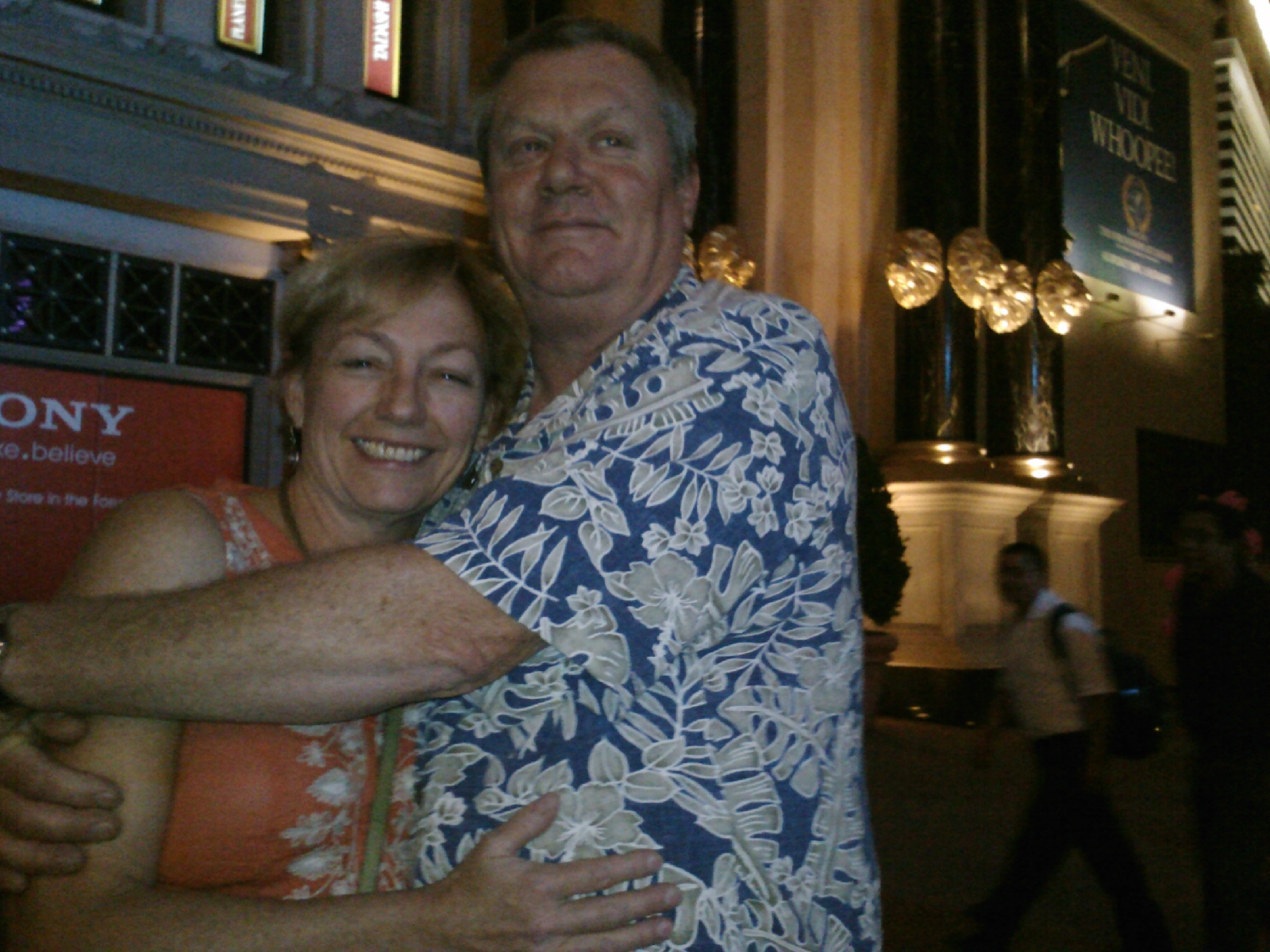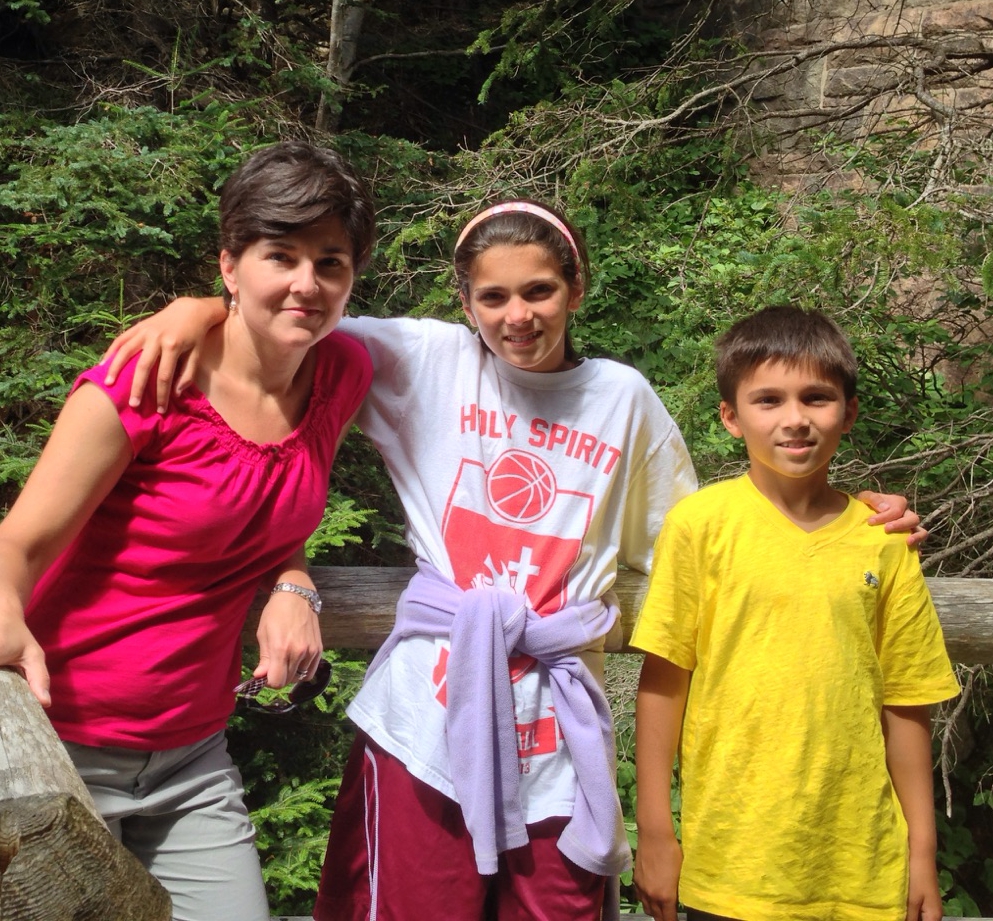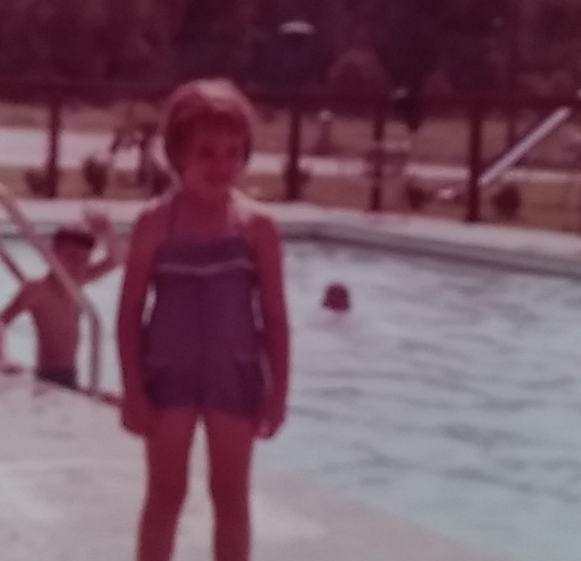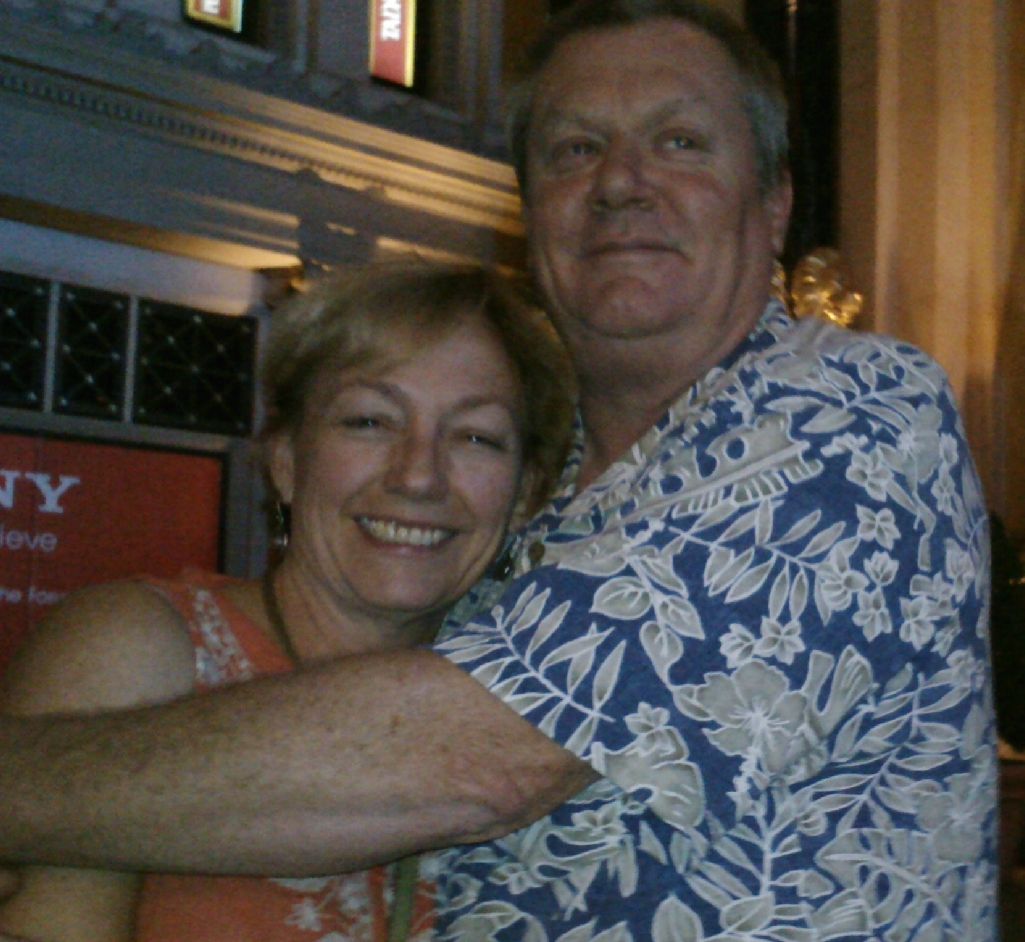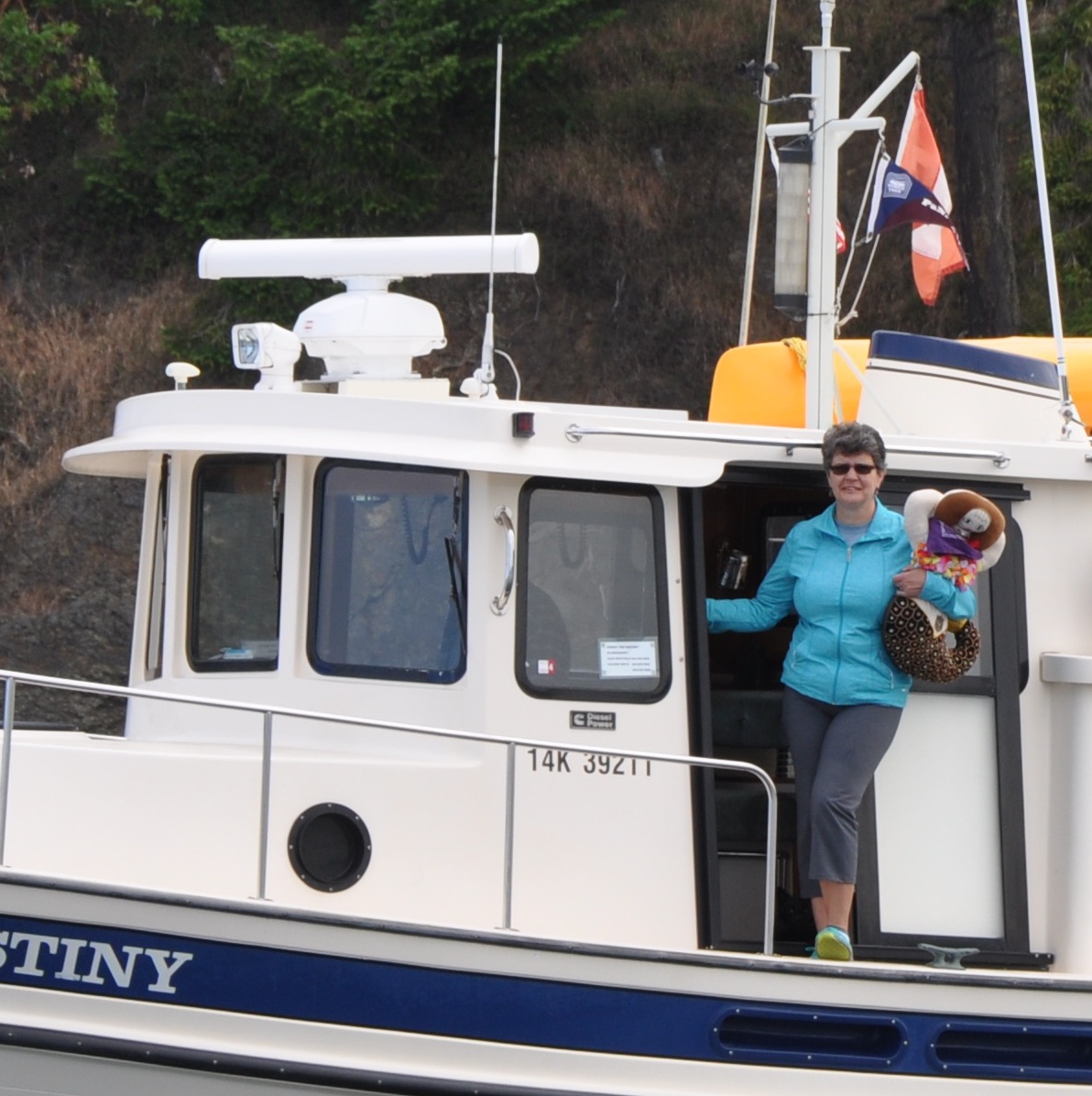I sat in a low-lying lawn chair, my feet resting on the bottom rail of an iron fence that guarded the hotel’s swimming pool from the tumbleweeds and debris driven by the constant Wyoming winds. I watched the prairie near Gillette turn dark as a thunderhead loomed above and shut out the late August sun. Gales churned the clouds. Instead of soft butter, a foreboding creature emerged. I marveled at the sight of the storm as it gobbled up the bright blue summer and spat out hues of steel gray, midnight black, and ominous green. Multiple arms, legs, and heads grew from its Medusa’s torso. I witnessed day and night, life and death in the middle of the afternoon.
As lightening frolicked and darted across the sky and thunder rumbled off beat in nature’s powerful and beautiful dance, the hair on my arms and head stood on end. Tears fell. I felt like I should leap over the fence into the wild grass, let the rain pound into me, sway wildly, look straight into the eyes of that Medusa storm, and let it turn me to stone.
* * *
Jeff and I had been married for twenty-three years. We shared many interests – gardening, cooking, canning. We loved visiting our grandchildren and attending Jeff’s barbequing competitions. The slowdown of the construction business had driven Jeff to find employment as a carpenter in Gillette, Wyoming, three hundred miles away from home. We bought a travel trailer that Jeff parked on the grassland outside Gillette. He lived there during the week, limiting his time with me in Loveland, Colorado to weekends. What we originally thought would be a short-term gig grew into a three-year stint.
One Christmas Eve, Jeff’s co-workers were so alarmed by his ill appearance on the job site that they encouraged him to stay in town. When he refused, they called me with an urgent request to let them know when he had arrived home safely. Normally vibrant, on-the-go from the time he woke at four a.m. until bedtime, well tanned, robust, with bright blue eyes, Jeff’s appearance shocked me when he walked through the door that evening. His skin was pale, ghostlike; his chest heaved with each breath, each step he took. I remember thinking his drive home must have been grueling. A stubborn man, Jeff and I argued until he agreed to go to the doctor as I left for work.
I hoped to get someone to cover for me, so that I could join him. But upon arrival, I was assigned to the emergency room and required to stay. Three people in critical condition arrived simultaneously, the third my husband Jeff. As a respiratory therapist, I am responsible for placing people on life support equipment. While I attempted to stabilize one critical patient, my coworker cared for a critical child. Staff members urged me to remain with Jeff. I kept running back and forth from him to the critical patient I was working with until relief arrived.
The bleeding gums that had begun three months earlier, the gradual tiredness and sleepiness that we had attributed to a gum infection, periodontal disease, working away from home, and putting in long physical hours now had a name.
The ER doctor took a deep breath, almost whispered, “Jeff, you have AML, acute myeloid leukemia.”
Leukemia? I felt horrified, stupid, and guilty. As a respiratory therapist why didn’t I zero in on the signs of leukemia?
Jeff looked to me for answers.
Immediate treatment was necessary, no time to research or to wait.
Chemotherapy drugs poured through Jeff’s veins. He succumbed to daily blood analysis, vomiting, diarrhea, drug allergies, rashes with intolerable itching, no privacy, and little sleep. We celebrated New Year’s Eve and my January birthday in his isolation room filled with bins for masks, gloves, and blue plastic gowns. A sign with isolation written in red letters hung on the entry door. An infection could kill him. A month later I wheeled him, thirty pounds lighter, out of the hospital to our car.
“Four more rounds of chemo to go,” he said as he crawled in, his outlook positive, determined. But he did not complete the treatment.
One morning, ninety-nine days after diagnosis, Jeff walked into the emergency room once again – this time, writhing with horrific gut pain that doubled him over.
My husband, a strong man, lay helpless with a breathing tube in place, unable to speak. As I looked at him, his heart rate raced, beads of sweat formed on his forehead, nurses and doctors scurried around him, starting intravenous lines, drawing blood, giving medications, noting his respiratory and cardiac status. I told him I loved him. He nodded. He heard me. I searched his face, watched the monitors, searched for hope. I thought of our wedding day, our celebration held on the lawn of our home with friends and family present and perfect for us. He and his friends sang and played guitars for our reception under a perfect sky. Even though we’d been married for 23 years, whenever he introduced me, he would say, “This is my bride, Terri.”
The on-call surgeon arrived, explained, “Jeff’s body has no blood clotting capacity. He would not survive surgery. I’m sorry.”
The medical professional in me fully understood Jeff’s dismal situation. The wife in me hoped for a miracle. How could I give the order to end his life? But, within twenty-four hours I made the most difficult decision of my life – remove the medical equipment keeping Jeff alive. As a healthcare worker, I could not save my own husband.
Four months later, my sister, Cindi and I were in Gillette to support Jeff’s BBQ team – the High Plains Smokers – at the Smokin’ on the Prairie cook off and to visit with his co-workers, his family when he was away from me, away from Loveland. With time to spare before the afternoon event, we spent the morning exploring Devils Tower National Monument, the sacred home of Native American tribes of the plains. The first claimed national monument of the United States, Devils Tower explodes from a forest of pine trees in the Black Hills of Wyoming. Reaching for the sky with horizontal finger-like columns of rock pressed together, it’s a geological masterpiece that entices many, including rock climbers, to visit.
“I’m glad we decided to come here. Devils Tower is on my bucket list,” Cindi said.
“Agreed. I’ve wanted to come here for years after seeing the movie, Close Encounters of the Third Kind.”
We walked the path around the monument’s base in awe, welcomed the shade from the hot sun that the pines offered, and felt its power. We chatted about the Native American legend of Devils Tower and how an enormous bear scratched, jumped, and clawed to reach its frightened victims whose prayers were answered when the boulders they stood on erupted, thrusting them upward and away from danger. The odd rock formations and climbers inching their way up and down natural crevices in the tower intrigued us. Hidden in the foliage, birds jabbered as eagles soared above, creating moving shadows. Occasionally, we observed prayer cloths tied in tree branches. I wish I’d brought a prayer cloth of some sort to tie in the trees to honor Jeff.
The history of the area – the sights, smells, and emotions of the past – invaded my imagination. I daydreamed about tribal people erecting teepees, cooking food on a campfire, processing animal hides, and children running amongst the trees. I breathed deeply and felt peaceful on this sacred ground – a first since Jeff died. I silently prayed that he forgave me for the times I spoke sharply to him, argued with him, could not save him. The clanking of chains and the conversation of two young climbers who were scoping out routes up this majestic rock jolted me back to the tower.
“Should they be climbing here?” my sister asked.
I shrugged. “It certainly doesn’t seem right.” Lately for me though, nothing seemed right.
Cindi and I finished our hike and headed back to attend the BBQ competition, but first, we visited the site of Jeff’s weekday home. Not seeing him daily produced a disbelief that he had died; acceptance of his death remained difficult. My mind played tricks on me: Where is he? Maybe he decided to stay in Gillette for the weekend. Is there a BBQ competition this weekend? Where did he go? The fact that he would never again open the front door of our home and call out, “Honey, I’m home,” evaded me. I had decided to make the drive to support his team, seek comfort, and find some closure when I visited the site where his travel trailer had sat.
I dared not whisper to anyone that I had thought I might also find Jeff. They’d think I was crazy.
I exited the interstate, headed down the dusty road, pulled into the red dirt driveway, parked the car. The prairie smelled of fresh grass, the sun beat down on this August day, and to the west, far in the distance, I saw clouds gather as they often do on summer afternoons. The corralled horses raised their heads from grazing, looked our way. Maybe they were a bit puzzled. Maybe they missed Jeff, too. He fed them carrots and petted their noses when he got home from work.
“Would you give me a minute?” I asked Cindi. Stepping out of the car, I tried to suck in air, my throat tightened, tears welled up in my eyes, ran down my face. Traces of him were visible. The trailer was gone, but the pad he had shoveled into existence and the anchors that secured the trailer remained intact. I ambled over to his makeshift garden. Vague dried limbs of a tomato plant protected from the north winds by oil cloths tied to two wooden stakes reminded me of his love of gardening and the care he gave to each plant. But, much as I couldn’t save him, Jeff’s tomato seedlings he had planted in March had withered and died in my care. I shook and sobbed. In reality, I knew he had left this Earth. Denial could no longer reside within my head or my heart. A veil of emptiness and dark fell over me. I shook. “Cindi, will you drive?”
My sister drove us back to Gillette. Jeff’s BBQ team welcomed us with hugs and offers of condolences. We hadn’t seen each other since the funeral and I met some “smoker pals” for the first time. We all missed his presence, humor, and expertise.
Tony held up a bottle of Templeton Rye whiskey, Jeff’s favorite, held back tears, “The cook’s just not the same without our Jeffie. I can still hear him say, ‘No, don’t do it that way’.”
His friends chuckled, knowing the perfectionism and expertise Jeff brought his smoker team. And his stubbornness.
With the award ceremony over, his team wishing they had won a prize, and our bellies full of delicious smoked meat and side dishes, we said our goodbyes and returned to our hotel.
“Jeff had quite a number friends. I had no idea. Do you think you will hear from those guys again?” Cindi offered.
My spirits sank a little. “The Wyoming crowd, probably not. The Colorado friends, I’ll see from time to time.” The Gillette BBQ would remain bittersweet.
While Cindi called home, I contemplated the day on the hotel patio and watched the summer storm approach. As I sat, my heart pounded with grief so great that I didn’t know if I could survive another second, minute, hour or day. I didn’t find Jeff tending to his tomato plant, feeding the horses a carrot, cutting the brisket just right to catch the BBQ judge’s attention, or toasting to a successful cook with his pals. I didn’t find him anywhere.
The Medusa clouds picked up momentum. As they neared, thoughts of Devils Tower and the Native Americans who had occupied and honored this land ran through my mind. I stood and walked to the iron fence. My imagination ran rampant. Medusa invited me to dance. I obliged her. Picturing myself as a Native American woman wailing in sorrow over the loss of her warrior husband, I imagined that I climbed over the fence. As I danced with death, thunder echoed my cries and rain pounded into me. My drenched bright red-and-yellow skirt flapped against my legs. Lightning struck the prairie again and again, missing me again and again. I spun, arms out wide, tears mixed with rain. I stared into the face of Medusa, dared her to turn me into stone, turn my heart to stone. Lightning cracked across the sky directly above my head. Thunder roared, shook the earth.
Shuddered back into reality, I realized that my misery had placed one foot on the bottom rail of the iron fence, that my desire to end my life had brought the other to the top of the rail. The other side of the fence meant freedom from the pain raging in my heart, if . . . if I ran into the heart of the storm before it blew on by and if . . . if lightning struck me true. No more sleepless nights. No more chest pain that screamed at me to call 911. No more shakes. Ready to leap, I had remained still, like I did when the garbage truck screamed down my street and I stood on the curb wanting to jump in front of it. Would I be missed as I missed Jeff? What heartache would I cause my family and friends? How would my sister feel if she found me dead on the prairie?
I breathed, stepped away from the fence. Jeff would want me to live my best. He would be mad if I didn’t. I cannot harm myself. It’ll be okay. I’ll be okay. Breathe. My body trembling and soaking wet, I grabbed a towel from the hotel stock, dried my face and hair. I watched the Medusa storm move on. I thought about the prayer cloths I’d seen at Devils Tower tied to tree branches as an offering, an intention or in remembrance of those who had “walked on.” Sunlight emerged in the west, painting a thin line of light against the horizon. I realized that Jeff had “walked on” into the spirit world, and was free of pain. I noted the sun had changed the sky into shades of gold, pink, and orange. I felt peace, placed the towel, my own prayer cloth, on the lawn chair and returned to our room.
Cindi looked up from her book. “What the hell? You are drenched!”
I sat down beside her, delivered a wet hug. “Got caught in a storm.” Surprising myself, I also said, “Sis, I love you.”
She was stunned. We simply didn’t say, “I love you“ much to each other. Rarely in fact. Love was implied. “What? Well, I love you too.” She patted my shoulder and in older sister fashion gently pushed me away. “You’re getting me wet.”
“Thanks for coming with me. Thanks for being my big sister.” My heart ached a little less.
Terri Gerrard is a Respiratory Therapist, living and working in Loveland, Colorado. She writes poetry, short stories, and novels, fiction, and non-fiction. The stories and lives of people from all walks of life fascinate her. She is published in The Eclectic Reader, an anthology.
